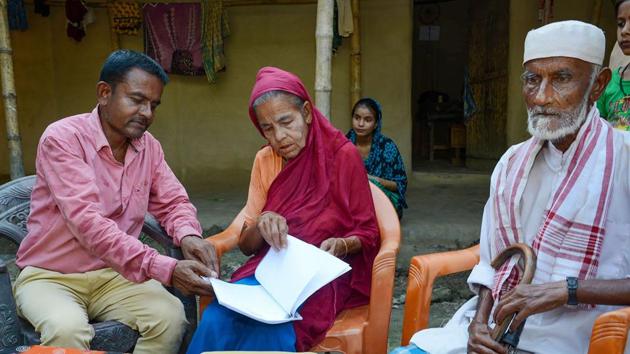NRC: Assam Accord is the legal shield for many of those excluded from the updated register
New narratives may influence the demand for making 1951 the cut-off year for identification of “Illegal Bangladeshi migrants” pushed by the BJP and the Sangh Parivar as well as those opposed to the cut-off date of 1971
The publication of the final list of the updated National Register of Citizens (NRC) in Assam has not sealed the process of identification of “illegal Bangladeshi migrants” in the state, the commitment for which was given by New Delhi way back in 1985 by signing the Assam Accord. Rather, ascertaining the actual status of 19.06 lakh excluded from the updated citizens’ register is going to be a long drawn judicial process. Around 3.11 crore of the total around 3.30 crore applicants were found eligible for inclusion in the updated NRC published on August 31.

Stories of exclusion of some members of the same families triggering apprehension of updated register splitting families highlighted in the media, allegations of exclusion of genuine Indian citizens or inclusion of “illegal Bangladeshis” raised by ruling Bharatiya Janata Party (BJP) and the opposition Congress and other parties, organisations may have reflected the structural deficiencies in the exercise and complexities arising from past historical realities in the determination of citizenship in Assam based on documentary evidences.
However, the updated NRC is a reminder of the fact that the Assam Accord provides a legal shield to scores of migrant people and their descendants and any dilution of the provisions of the Accord will leave them without any legal protection of the rights and entitlements they currently enjoy as Indian citizens. Such protections to migrants are not available in other states. The 1951 NRC in Assam has been updated by taking March 24, 1971 as the cut-off date to determine the eligibility for inclusion in accordance with the Assam Accord. In the rest of India, 1951 is the cut-off year for the determination of eligibility for citizenship under the Citizenship Act, 1955.
Ministry of external affairs spokesperson Raveesh Kumar clarified the Modi government’s position that “exclusion from the NRC has no implication on the rights of an individual resident in Assam” and those excluded would continue to enjoy the rights or entitlements as before, till they have exhausted all legal remedies.
The government clarification puts at rest speculation in the foreign media and a section of the Indian media of those excluded being reduced to “stateless. It does not make the excluded person “stateless”. It also does not make him or her a “foreigner” within the legal meaning of the term, adds the official spokesperson.
The Modi government has already extended the window period for those excluded for filing an appeal before the Foreigners’ Tribunals from the existing 60 days to 120 days. The Assam government has assured legal aid to those excluded and who are unable to afford legal assistance.
However, the government may have to wait for a directive from the Supreme Court which is monitoring the updating of the NRC in Assam if any action needs to be taken based on the updated citizens’ register.
Historical events of migration from erstwhile East Pakistan after Partition in 1947 and during and after the Bangladesh Liberation War in 1971 to Assam have made the determination of citizenship in the state a complicated exercise as compared to the rest of India.
The tripartite Assam Accord signed by the All Assam Students’ Union (AASU) and erstwhile Asam Gana Sangram Parishad with the government of India and Assam government in 1985 at the culmination of six-year long anti-foreigners agitation in Assam led to the acceptance of all the migrants from erstwhile East Pakistan who came to Assam prior to March 24, 1971 as Indian citizens. In respect of those who came from erstwhile East Pakistan between January 1, 1966 and March 24, 1971 are to remain disenfranchised for a period from ten years from the date of their registration with the respective Foreigners’ Regional Registration Office after their identification.
The Accord stipulates identification of all post-1971 migrants who entered without valid travel documents and living illegally in Assam, deletion of names from electoral rolls and their expulsion.
The Section 6A was inserted in the Citizenship Act, 1955 by an amendment in 1985 to include citizens covered by the Assam Accord i.e. migrants from erstwhile East Pakistan. This required devising a special procedure in the form of Rule 4 A in the Citizenship Rules, 2003 to include those migrants on whom the Section 6A confers citizenship. A petition challenging this Section is currently pending consideration by the Constitution Bench and the Supreme Court has clarified that the NRC in Assam has been updated subject to orders as may passed by Constitution Bench.
Modi government ruling out any coercive action against those excluded coupled with allegations of discrepancies in the updated register have started shaping new narratives on the effectiveness of the updated NRC. New narratives may influence the demand for making 1951 the cut-off year for identification of “Illegal Bangladeshi migrants” pushed by the BJP and the Sangh Parivar as well as those opposed to the cut-off date of 1971. The updated NRC will keep sounding the alarm bell against offsetting the social equilibrium fixed by the Assam Accord.
Sushanta Talukdar is a political analyst based in Guwahati and is the Editor or www.nezine.com, a bilingual online magazine on India’s Northeast.
The views expressed are personal



